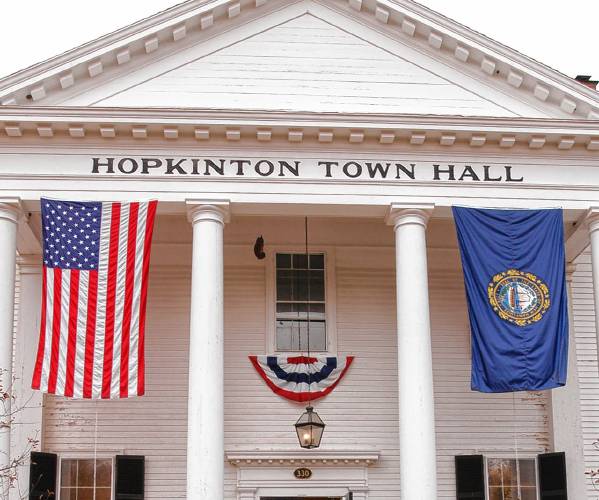Hopkinton divided on SB2 form of government

Hopkinton Town Hall AP
|
Published: 03-07-2024 4:36 PM
Modified: 03-07-2024 4:39 PM |
Open discourse at Hopkinton’s traditional town meeting is something Mark Zankel looks forward to every year because it offers him the opportunity to gain insights into diverse perspectives.
Stepping into these town meetings, Zankel, who sits on the budget committee, frequently finds himself initially leaning towards a particular vote, but his stance often shifts after hearing the opinions of fellow residents.
“I have strong convictions and I’ve had my mind change during town meetings, which I would really miss,” Zankel said at a hearing this week to consider splitting the process into two parts, commonly referred to as SB2. “I think that would be one of the negative outcomes if we go to SB2.”
In contrast to the school district public hearing, where a majority of those who spoke favored transitioning to the SB2 form of government, the town hearing saw a divided crowd testifying both for and against it.
Traditional town meetings allow for open-floor debates and elected officials to provide information and explain each dollar amount. Unless a secret ballot vote is specifically requested, votes are typically cast by a show of hands.
The SB2 legal alternative, also known as the Official Ballot Referendum form of town meeting, includes a deliberative session, similar to a traditional town meeting where residents discuss budgetary matters and warrant articles and propose amendments but vote on all matters at the ballot box in March.
The push for SB2 stems largely from the convenience it offers people to take a ballot and vote in a short amount of time as opposed to sitting on school bleachers for hours on end at a traditional meeting. Advocates said it caters to individuals who work nights or weekends, those facing physical limitations or families with children with tight schedules.
Residents in favor of SB2 argued that it would allow more participation in town politics.
Article continues after...
Yesterday's Most Read Articles
 Concord may finally buy long-closed rail line with hopes of creating city-spanning trail
Concord may finally buy long-closed rail line with hopes of creating city-spanning trail
 New Hampshire targets sexual exploitation and human trafficking inside massage parlors
New Hampshire targets sexual exploitation and human trafficking inside massage parlors
 State rules Epsom must pay open-enrollment tuition to other school districts, despite its refraining from the program
State rules Epsom must pay open-enrollment tuition to other school districts, despite its refraining from the program
 New Cheers owners honor restaurant’s original menu while building something fresh
New Cheers owners honor restaurant’s original menu while building something fresh
 Remembered: Friends recall stories about the lives of those who died without housing
Remembered: Friends recall stories about the lives of those who died without housing
 A look ahead at the ‘preferred design’ for Concord’s new police headquarters
A look ahead at the ‘preferred design’ for Concord’s new police headquarters
“It’s not being democratic, it’s not being inclusive and it’s not giving access to everybody,” said Candace Youngman, referring to voter turnout that is only 10% at the town’s traditional meetings.
But, opponents of SB2 caution against the potential pitfalls of this system. They said that a small motivated group of residents can wield outsized power at deliberative sessions and make drastic amendments, like gutting the budget. On voting day, no changes can be made to the ballot. Furthermore, without comprehensive information on warrant articles, voters could be making a decision they don’t comprehend.
“My understanding is 300 well-informed voters are a lot better than 3,000 to 4,000 uninformed voters and that’s what this type of meeting allows us to do,” said Michael Foley, in opposition to SB2.







 ‘A little piece of everything I like’: New Pittsfield barbershop brings more than a haircut to downtown
‘A little piece of everything I like’: New Pittsfield barbershop brings more than a haircut to downtown NH judge decides to pause Trump’s birthright citizenship order
NH judge decides to pause Trump’s birthright citizenship order Canterbury honors ‘real heroes’ with updated Military Veterans’ Project
Canterbury honors ‘real heroes’ with updated Military Veterans’ Project Look, up in the sky! It’s… an Airstream trailer?
Look, up in the sky! It’s… an Airstream trailer?
